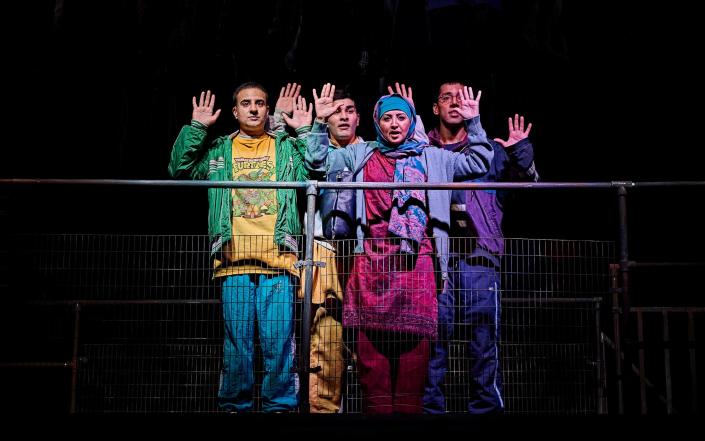
“Women are not third-class citizens.” So proclaims mother-of-three Fariba in a courageous speech to fellow parents, denouncing the Taliban as thugs – a powerful parallel to the current protests in Iran, and a bleak observation that Afghanistan now looks much as it did back in 2000, when this play is set. Soon there’s an ominous knock at the door, the cue for her family to flee to the UK, where they also hope that son Hussein can get life-saving treatment for his heart condition.
This Wales Millennium Centre production, which premiered last year and now has an encore run at the National, is a stirring adaptation of the 2020 book by Hamed Amiri (Hussein’s brother) chronicling their perilous journey and new life in Cardiff. There’s a sheer moral clarity to its directness, even if it is inescapably flawed theatre.
Amit Sharma’s production captures the bewildering speed of their waking nightmare: just one day to sell everything they own, after which they are at the mercy of traffickers as they inch across Europe. Physical discomfort (freezing in a Russian apartment, jam-packed into a car boot, gasping for breath in a shipping container) mingles with boredom, uncertainty and sheer terror.
An impressive five-strong cast switches between the Amiris and supporting characters – like the shifty fixer who asks the youngest boy to hold his gun. A veiled threat or warped friendship? I also can’t forget the little girl, conjured by actress Houda Echouafni holding up a pair of pink wellies, who matter-of-factly relays that her sister was “lost” by traffickers; that happens a lot with girls.
I just wish Phil Porter’s adaptation trusted its audience more. Instead, we get heavy-handed narration and blunt dialogue, commentating on the family’s closeness or the dangers they face. They stop sounding like people, which, ironically, runs counter to a clear effort to humanise these (such a loaded term) refugees.
That comes more organically when we get to know them: Ahmad Sakhi, Farshid Rokey and Shamail Ali as the football-mad boys, aged just 14, 10 and 7, bickering over who’s playing for Man U; Houda Echouafni’s fiercely principled Fariba; Dana Haqjoo’s Mohammed, cracking dad jokes. However, the character of Hussein (Sakhi) – who sadly passed away in 2018 – is too saintly, although his heart condition is strikingly expressed in stylised spasms.
The combination of projected surtitles and kooky graphics adds to the annoying feeling of being spoon-fed. And Elaha Soroor’s mournful Farsi singing is too ubiquitous for a story that, ultimately, is one of joyful thanks: for family, for the NHS, for sheer good fortune. Others, it reminds us, aren’t so lucky.
Until Nov 12. Tickets: 020 3989 5455; nationaltheatre.org.uk




